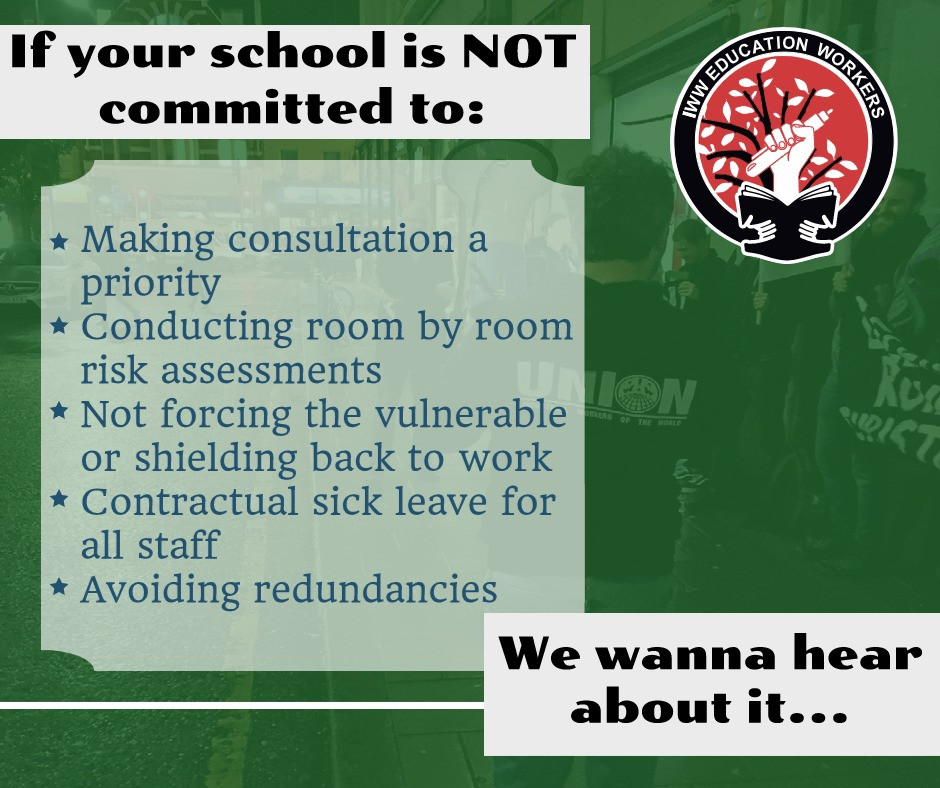The thing about a crisis…
I’m a TEFL teacher (Teaching English as a Foreign Language). I’m also an organiser with the TEFL Workers’ Union, which is part of the Industrial Workers of the World (IWW). It’s not an industry with a history of trade unions, strikes or – save a few notable exceptions – much in the way of worker militancy at all.
In an industry that epitomises a marketised, privatised, neo-liberal educational model, the pandemic and accompanying redundancy crisis has seen our union grow to hundreds of members. We are a small but effective counter-weight to employers who’ve never had to reckon with any sort of organised opposition from their workforce.
We just won, for example, roughly £100,000 in total unpaid holiday back from EF, a chain language school whose owner is worth 6 billion dollars. We’ve won various employment tribunals in regards to staff who were falsely classified as self-employed. We trained up dozens of people who acted as employee staff reps during their schools’ redundancy consultations.
…is that it lays bare…
But we also shouldn’t underestimate the challenges we face. Roughly half the TEFL workforce was made redundant this year. One big international chain, Kaplan, forced a 10% pay cut on their entire staff: even if you survived the redundancy cull, you had to sign away a full tenth of your pay packet.
TEFL schools love to talk about the company as “a team”, “a family”, but consider how the industry handled the furlough scheme:
The ‘respectable’ schools were willing to keep staff on for the first part of the furlough period. But as soon as the scheme began to require employers to contribute even a small amount of money to the cost of keeping staff furloughed, a tsunami of redundancies followed. It turns out that the only team that ever really mattered was that of the shareholders. The only family that mattered was the family of capital: investment, revenue, and profit.
Your manager’s words about putting staff “at the heart of what this company does” ring hollow when you know your school wouldn’t contribute £20 a week so you could stay on furlough.
Having that understanding and having the confidence to fight back, however, are two different things. Most of our fights have been defensive. We win tribunals because the industry is such a joke that schools have just blatantly broken the law for years.
Pushing for things above which you’re legally entitled means operating outside of a defined legal framework of grievances and employment tribunals. The next step: to turn the experience (and, hopefully, confidence) gained through these defensive struggles brought on by the pandemic into offensive struggles for things like paid preparation time, guaranteed hours contracts, and paid sick days.
…the reality of the employer-employee relationship.
The opening line to the IWW constitution reads ‘The working class and the employing class have nothing in common’. It’s this radicalism that’s kept the IWW alive for the past century: people join because they want to keep alive the dream of a revolutionary working class “building a new society in the shell of the old.”
But the influx of members who’ve joined through the TEFL campaign have largely done so because the IWW is the union in their workplace and their industry. This puts the IWW in the interesting position of – for the first time in a long time – having to consider what political education looks like.
In an age when the vast majority of workers haven’t ever even seen a picket line, how do you instil the idea that, as a union member, you never cross a picket line? How do you draw the connections between the COVID crisis with the larger reality of a society in which every crisis is an opportunity for employers to tip the balance of power a bit more in their favour?
I’ll end by saying that we’ve been supporting a group of teachers at an online school where the conditions are so bad we’ve nicknamed it “the sweatshop of English language teaching”. The average age of the workforce is between 18-21 and these workers are some of the most dedicated and inspiring I’ve seen in my 20 years in the union movement. How they interact with each other, largely free of prejudices that were commonplace when I was a teenager, is heartening. Their seemingly intuitive understanding of the exploitation they face in the workplace – and the need to fight back against it – gives me hope.
I expect their generation will be shaped by the pandemic in ways we can’t imagine; an experience they’ll carry with them for their entire lives. If even half their generation has their same outlook, maybe there is some hope for this world.
This text originally appeared in the Pandemic Notes Workbook, a project of the London-based May Day Rooms. Full workbook available here: https://pandemic-notes.maydayrooms.org/workbook/
